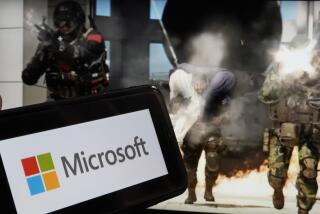Microsoft Settles Patent Dispute With Stac, Agrees to License Technology : Software: The industry leader will buy an equity stake in the small Carlsbad firm. The agreement supersedes jury’s award.
SEATTLE — Software giant Microsoft Corp. conceded defeat to a company one-hundredth its size Tuesday when it agreed to license technology from Stac Electronics Co. and take an equity stake in the Carlsbad, Calif.-based firm to settle a grueling, yearlong patent dispute.
Under the deal, Microsoft will pay $1 million a month for 43 months to license Stac’s compression technology. It will also pay $39.9 million for preferred stock that can be converted in 2004 into a 15% stake for $9 a share.
The agreement supersedes a Feb. 23 jury decision ordering Microsoft to pay Stac $120 million in damages for using data-compression technology that infringes on two Stac patents. The technology allows twice as much data to be stored on the same space on a computer’s hard disk drive.
Microsoft, the No. 1 maker of personal computer software in the United States, will not receive $13.6 million awarded it in a counterclaim against Stac for reverse-engineering a Microsoft product. The company also does not have to cover the $7 million to $8 million in legal costs incurred by Stac, a company with 1993 sales of $37 million.
The agreement comes just two weeks after a federal judge ordered Microsoft to recall all unsold copies of its MS-DOS operating system containing the disputed technology. The decision was an about-face for Microsoft, whose chairman, Bill Gates, even took the stand during the Los Angeles patent trial.
“We had to sacrifice some of our internal objectives and our emotions and do the right things by our customers,” said Paul Maritz, senior vice president at Microsoft’s systems division.
Microsoft had previously played down the importance of Stac’s court victories, arguing that it had already begun selling in April a new version of its operating system that did not include the disputed compression technology. And as late as last week, Microsoft had persuaded a judge to temporarily stay the injunction ordering the recall.
But retailers have been concerned about being caught in the middle of the dispute and expressed concern that they would be forced to check every computer in their inventory to find out which version of MS-DOS they contained.
“This agreement means our customers . . . worldwide can sell and use all versions of MS-DOS without concern,” Maritz said.
Said Gary W. Clow, Stac’s chairman and chief executive: “Today’s agreement immediately ends our conflict with Microsoft and ushers in a new era of cooperation between the two companies. It puts an end to our burdensome legal fees, creates a royalty stream, puts money in the bank and, most importantly, aligns Microsoft’s interests with the interests of Stac.”
Microsoft and Stac agreed to license each other’s existing compression patents as well as new patents obtained over the next five years.
Microsoft sought a license to Stac’s compression technology in talks that began in 1990, but the two sides failed to reach an agreement.
In January, 1993, when it became clear Microsoft would go ahead with plans to offer data compression using what it said was an alternative technology, Stac sued. The company charged that Microsoft’s DoubleSpace program, included in MS-DOS 6.0 and other versions of its operating system, infringed on Stac’s patents and would hurt its sales.
In spite of a broadening product line, Stac’s sales steadily shrank, falling to $9.7 million in the quarter ended March 31, from $11 million in the year-earlier period.
Stac shares surged $1.50 to close at $6.625 on Nasdaq; Microsoft, also on Nasdaq, slipped 87.5 cents to $52.625.






